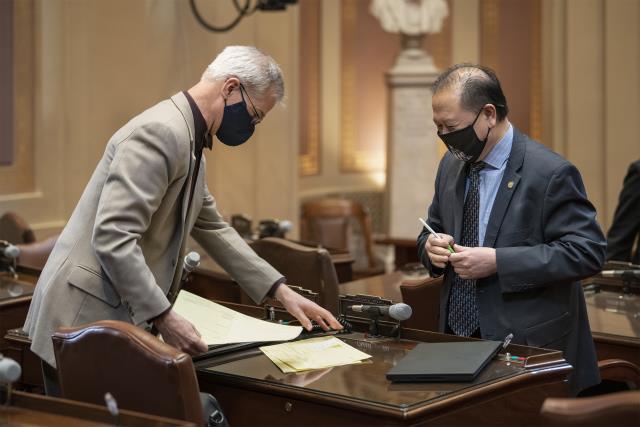Thank you to those of you who were able to attend our virtual District 66 Town Hall meeting on Monday. We were pleased with the turnout and enjoyed the questions and conversation. You can view a recording of the meeting
here.
Below is the third part of this year’s session report on issues and concerns that I want to highlight. As indicated previously, this year’s session report is coming in three installments in order to devote space to a variety of important issues from this session.
Here is a link to the
first and
second installments which you should have received previously.
Please continue to contact me with your concerns, suggestions, or questions, with the contact information below.
Thank you for giving me the honor to serve as your senator.
Sincerely,

John Marty

Rejecting Federal Food Assistance; Refusing to Help Hungry People
While there was bipartisan support for maximizing the federal funds available to Minnesota during the past year, when some of those federal funds would allow more low-income working families qualify for SNAP food assistance, Senate Republicans voted unanimously against it.
In the Health and Human Services bill, I backed an amendment to expand eligibility for food assistance up to 200% of the federal poverty line. Because the federal government was providing all the funding, the only cost to the state to get as much as $40 million per year for hungry families, would be about $14,000 for reprogramming and administrative costs.
We heard from a couple in their mid-70s who had retired, assuming their 401k and social security would be sufficient to make ends meet. But they cannot afford groceries and were struggling month after month. For a two-person household, these federal funds would expand coverage for people with a total income between about $28,740 and $34,840 per year.
The people that the Senate refused to help include low-income retirees and working people who are struggling to put food on the table. Here is a clip of my speech in support of accepting these federal funds to help low-income families: https://youtu.be/2uk422MM9s8?t=2294
As one of the wealthiest states in the wealthiest country there is no reason to have hungry people in Minnesota.
“Cooking the Books” Undercuts Public’s Ability to be Informed
For almost twenty years, Minnesota law directed state budget forecasters to include the impact of inflation on projected state revenues but
not on state expenditures. Counting inflation on only one side of the equation is effectively
cooking the books. It distorts budget realities.
When a higher cost of living means businesses pay their workers more, there will be an increase in income taxes coming from those higher wages. However, when the state budget is required to pay more to get the same products or services, the law explicitly prohibits the calculation of those costs in budget projections.
This artificially makes the state budget condition look better than it is; it also enables politicians to twist the truth. For example, when the Senate Republicans offered their proposed education budget, their PR claimed that they were “Fully Funding Education” and they talked about their generosity to schools. However, the $152 million they proposed fell far short of the $518 million impact that inflation has on schools for the next two-year budget period. In effect, their budget would produce a $350 million cut to Minnesota E-12 education. That isn’t what most people would call “fully funding education.”
Inflation is not an “optional” expenditure. Utility costs, contract costs, and health insurance costs significantly rise year after year, whether the budget forecast acknowledges that or not.
Because the DFL House and Governor Walz both proposed significantly more education funding, the final compromise provided about three times as much money as the Senate Republicans, and the new budget will be sufficient for most school districts to keep up with inflation.
All of us, both elected officials and the public, should recognize the importance of using accurate information in setting the state budget. As a result, I introduced
SF 2362, which would repeal the provision in law that requires the state budget agency to ignore inflation from one side of the budget forecast. Although I was denied a hearing this year, I will continue pushing it next year.
Bizarre Attempt to Transfer Control of State Historic Sites from Historical Society
The Senate State Government budget bill contained a provision moving state historic sites, including Fort Snelling and the Split Rock Lighthouse, from being managed by the Minnesota Historical Society to a small office with ten employees in the Department of Administration. There were no hearings on the proposal explaining the rationale, and it was added to the budget bill shortly before the bill was considered in committee with no notice to the Historical Society, whose director was mystified by the proposal.
Some of these sites are major attractions that draw tens of thousands of visitors per year. The Historical Society has maintained and operated these sites for decades and has carefully preserved them and opened them to the public. Neither the Minnesota Historical Society (MHS) nor the Department of Administration supported the move, and the Commissioner of Administration pointed out that the small office designated as the new manager of the sites did not have the capacity or the expertise to operate the sites.
The author of the legislation said that she was upset that the MHS was “embroiled in a huge amount of controversy," so she wanted to remove the historic sites from their jurisdiction. Apparently, her comments about MHS “controversy” comes from MHS work reflecting aspects of history and perspectives that were previously ignored.
Despite the opposition from both the Historical Society and the agency that was supposed to operate them, the legislation passed the full Senate. Fortunately, the House rejected the transfer in negotiations, so the Historical Society will continue to manage the sites.
Contact Information
If you wish to get in touch with me please call my office at 651-296-5645 or reach out to my legislative assistant, Elspeth Cavert, at elspeth.cavert@senate.mn.